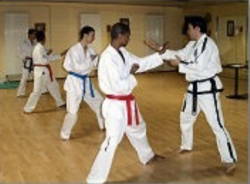Difference between revisions of "Matsogi - uk"
m (Typing fault correction) |
m (Typing fault correction) |
||
| Line 4: | Line 4: | ||
[[File:Mastogi.png|right|250px]] | [[File:Mastogi.png|right|250px]] | ||
| − | Taekwondo students learn the techniques of | + | Taekwondo students learn the techniques of Matsogi. Those are taught with the movements from the tuls to learn how to apply them in sparring. <br> |
| − | There are three types of | + | There are three types of Matsogi: Sambo Matsogi (three step sparring), Ibo Matsogi (two-step sparring) and Il- bo Matsogi (one step sparring). <br> |
For the yellow belt exam, candidates must perform five three steps. This is done in pairs. | For the yellow belt exam, candidates must perform five three steps. This is done in pairs. | ||
| + | |||
===== Methodology ===== | ===== Methodology ===== | ||
You stand facing each other, bow to each other, then the attacker (pre-arranged) measures the distance needed to perform the attack. After that, the attacker goes backward with his right leg in gunnun sogi najunde bakat palmok makgi. This is the initial position in which each three-step is carried out.<br> | You stand facing each other, bow to each other, then the attacker (pre-arranged) measures the distance needed to perform the attack. After that, the attacker goes backward with his right leg in gunnun sogi najunde bakat palmok makgi. This is the initial position in which each three-step is carried out.<br> | ||
Latest revision as of 09:48, 18 April 2020
Document containing source information
Taekwondo students learn the techniques of Matsogi. Those are taught with the movements from the tuls to learn how to apply them in sparring.
There are three types of Matsogi: Sambo Matsogi (three step sparring), Ibo Matsogi (two-step sparring) and Il- bo Matsogi (one step sparring).
For the yellow belt exam, candidates must perform five three steps. This is done in pairs.
Methodology
You stand facing each other, bow to each other, then the attacker (pre-arranged) measures the distance needed to perform the attack. After that, the attacker goes backward with his right leg in gunnun sogi najunde bakat palmok makgi. This is the initial position in which each three-step is carried out.
In theory, the defender determines which attack will be performed, but for practical reasons (on the distance between the performers), we recommend that the attacker decides which attack he will be performing. After all, the defender knows beforehand what technique the attacker will use).
Once the attacker has called the technique, he states that he is ready to attack ("TSE"). The defender ponders what technique he will use to defend and indicates that he is ready ("TSE"). The defender may take his time to get prepared for.
Afterwards the attacker kicks or punches and the defender defends/blocks three times. The defender then performs a counterattack.
Then reverse roles. The attacker brings his front leg back to NARANI SOGI (ie backwards) and the defender brings his back leg forward to NARANI SOGI. Now it's up to the person who has just defended for to attack.
Attention to:
It is important to set the feet in the right place. In an attack in niunja sogi, the attacker's feet are placed on the outside of the feet of the defender. If an attack is in gunnun sogi the foot of the attacker is placed on the right side of the foot of the defender, so first on the outside and second time on the inside.
The defender performs a counterattack depending on the distance between the two people. If the distance is large then a kicking technique can be used; it is recommended to have a hand technique at a short distance.
